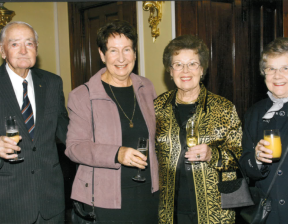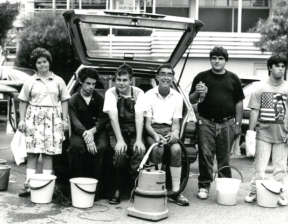Today we're introducing you to Sister Maureen O’Connell, and sharing part of her life as student, teacher, Special School Principal, Manager of Post School Services and former Leader of the Dominican Sisters, CABRA, SA.
And, importantly for Bedford, highlighting her role as the person integral to the creation, management and growth of programs for people with disability that would eventually become Bedford’s Day Option Service in 2006.
Bedford Day Options has since expanded to six sites and continues to provide meaningful recreation, leisure, life-skills and development activities for Bedford clients. As a reflection of recognition and deep gratitude for laying the foundations for those services, Sr Maureen was inducted as a Bedford Life Member in 2007.
Original connection with disability
Bedford was a daily landmark in Sr Maureen O’Connell’s young life, as far back as she can remember. Living in Colonel Light Gardens, she was one of six children who attended St Therese Primary School – across the road from Bedford at Panorama. Maureen’s mother volunteered regularly at the Bedford canteen during school hours. Sr Maureen says, “As a child I learned from my mother, Doreen, the importance of supporting people with disability.”
Developing education and experience
Sr Maureen later attended Cabra College where she was taught by the Dominican Sisters, a teaching Order. She always knew she wanted to do something more with her life, but was unsure of the direction until her mid 20’s, when she decided to join the Dominican Order.
At that time, women joining the Dominican Order trained for religious life and teacher education in both Sydney and Canberra. As Sr Maureen’s special interest was in disability, she also pursued Special Education study at Flinders University. Soon after, Sr Maureen was appointed Principal of St Ann’s Special School at Marion.
During her time at St Ann’s, Sr Maureen and her staff secured funding to do a ‘School-to-Work’ program for children with disability, and students in their latter school years undertook placements in the local community. “We had several students working in the Pizza Hut chain, at local councils, cleaning cars at schools or government departments… so a lot of our students were used to going from school to work,” Sr Maureen recalls.
The class of students Sr Maureen taught had the most complex of disabilities, many without language, and the traditional pathway from school to work would not be a natural evolution for them. “We had to find activities in the community for them to learn life skills, like shopping, banking, negotiating escalators, ramps and stairs, and using public transport.”
“At that time, there was a lot of talk about what Canada was doing, they seemed to be at the cutting edge in disability, and I wanted to find out more,” Sr Maureen recounts. She was granted a year off to study in Canada and was fortunate to study under Professor Roy Brown at the University of Calgary.
“After my study leave, I came home to Adelaide with fresh ideas for post-school services for students graduating from St Ann’s and St Patrick’s Special Schools',” she said. Those programs included Community Vocational Support (CVS) and Diocesan Community Access (DCA).
Programs and progress
Together with a number of parents and staff from St Ann’s and St Patricks, and with Joe O’Neill from Catholic Welfare Service, the Diocesan Association for Intellectually Disabled Persons (DAIDP Inc) was formed and Sr Maureen was appointed Manager of the CVS and DCA Post School Services programs. In 1986, submissions for government funding were successful and, together with fundraising, both programs flourished for almost two decades!
The programs were supported by trainers with a Special Education degree, and students were split into groups. Each group had a bus and they would go out to undertake different activities in the community. In addition to work crews in cleaning and gardening, another group were trained in hospitality, and opened a coffee shop in the Glandore Community Centre called ‘The Glasshouse’, which ran for several years.
After two decades of running the programs successfully, the gap in government funding could no longer be sustained. DAIDP Board Members approached the Bedford Group with a view to amalgamating both programs with Bedford services.
Bedford welcomed the proposed amalgamation and in 2006 DAIDP staff and clients moved to Bedford, bringing with them the programs that formed the foundation for Bedford’s Day Options under Manager Paquita Spurr. “I was really happy with the amalgamation and could see how the Day Options Program would enhance Bedford services by providing life skills training for those needing support, beyond employment,” Sr Maureen said.
“The momentum of the program was easy to sustain with familiar staff, and the clients just changed their bus routes and kept going with minimal disruption.”
Bedford Life Membership
Sr Maureen was joined by four other DAIDP Board Members in receiving Bedford Life Membership in 2007. She says,"Receiving Bedford Life Membership was such a lovely surprise, and very special. At the time it was an acknowledgement and recognition that the work we had done over the years as a small ‘pwd’ organisation was worthy of a large ‘pwd’ organisation like Bedford."
Looking back, Sr Maureen said that working with children and young adults with disability was a reward in itself - watching them progress, and joining in on a bunch of great activities like going on camp, horse riding, and discos, "...it was so much fun, and like a second childhood!" she laughs.
"A lot of young people with disability are getting jobs out there now, and that’s because the community is becoming more accepting. But first they have to be aware – and they’re only becoming more aware because of the work that Bedford does."
Find out more about Bedford’s Day Options and Experiences Program
Editors post-script
The nature of a profile means that we don’t always get to credit the networks of people who helped support the work of our Life Members, but passionate parents and advocates are multitude in these stories - especially in a disability setting.
During interview, Sister Maureen frequently includes the names of people who ‘should be recognised’. It was clear she wanted to share the spotlight with the people who came up with new ideas, tirelessly fundraised and mobilised to provide support to getting community programs set up for the benefit of their children and community. Here are just a few of the people she credited with being at the forefront of change for their children, and by extension, for people with disability in South Australia;
Peter and Angela Roodhouse – On the Board of Community Access Service (CAS), and in 1982, they first asked the important question – ‘are there students with special needs that could manage in the mainstream?’
Elaine MacFarlane (retired) - received an OAM in the 1988 Queens Honours list for service as a teacher of physical education to young people with intellectual disabilities.
Des Byrne
(deceased) – Board Member of the DAIDP – made a Bedford Life Member with Sr Maureen in 2007.
Darryl Knight – Board Member of the DAIDP – made a Bedford Life Member with Sr Maureen in 2007.
Matt and Alison Tiddy (both deceased) – On the board of the DAIDP – made Bedford Life Members with Sr Maureen in 2007.
Brian Gitsham - first President of DAIDP Board
Aileen Byrne (deceased) - first secretary of the DAIDP Board
Barb Smith (deceased) First suggested the amalgamation with Bedford.




